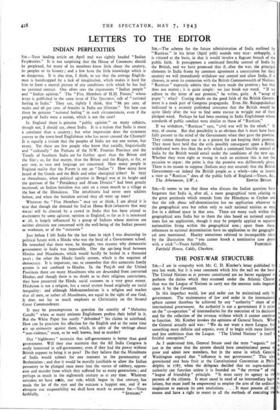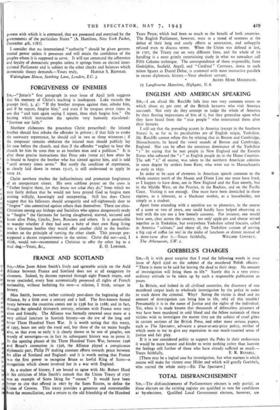THE POST-WAR STRUCTURE
Snt,—I am in sympathy with Mr. C. D. Kimber's letter published by you last week, but it is your comment which hits the nail on the head The United Nations as at present constituted are no better equipped to perform the duties which they assumed under the Atlantic Charter than was the League of Nations to carry out the onerous tasks imposed upon it by the Covenant.
In this imperfect world, law and order can be maintained only by government. The maintenance of law and order in the international sphere cannot therefore be achieved by any " authority " short of an international government. An authority is not a government if it relies on the " co-operation " of intermediaries for the execution of its decisions and for the collection of the revenue without which it cannot continue to function. Mr. Kimber invokes the opinions of General Smuts. What the General actually said was: "We do not want a mere League, bu something more definite and organic, even if to begin with more limited and less ambitious than the League. 'The United Nations' is itself fruitful conception."
As I understand him, General Smuts used the term "organic " not just in the sense that the system should have constitutional power t grow and admit new members, but in the sense in which Genet Washington argued that " influence is not government." This ide germinated and bore fruit at the Constitutional Convention at Phil delphia in 1787, when the delegates decided that no supra-nation authority can function unless it is founded on " the reverse" of t "league of friendship " principle. "It must carry its agency to the persons of the citizens. It must stand in need of no intermediary leg: lations, but must itself be empowered to employ the arm of the ordina magistrate to execute its own resolutions. . . It must possess all t means and have a right to resort to all the methods of executing t, ik powers with which it is entrusted, that are possessed and exercised by the governments of the particulars States " (A. Hamilton, New York Packet, December 4th, 1787).
I consider that no international " authority " should be given govern- mental power unless it possesses and will retain the confidence of the peoples whom it is supposed to serve. It will not command the adherence and loyalty of democratic peoples unless it springs from an elected inter- national Parliament and is subject to the other checks and balances which



























 Previous page
Previous page